Tips to Write a Reflective Essay on a Presentation
📅 Updated on September 20th, 2023
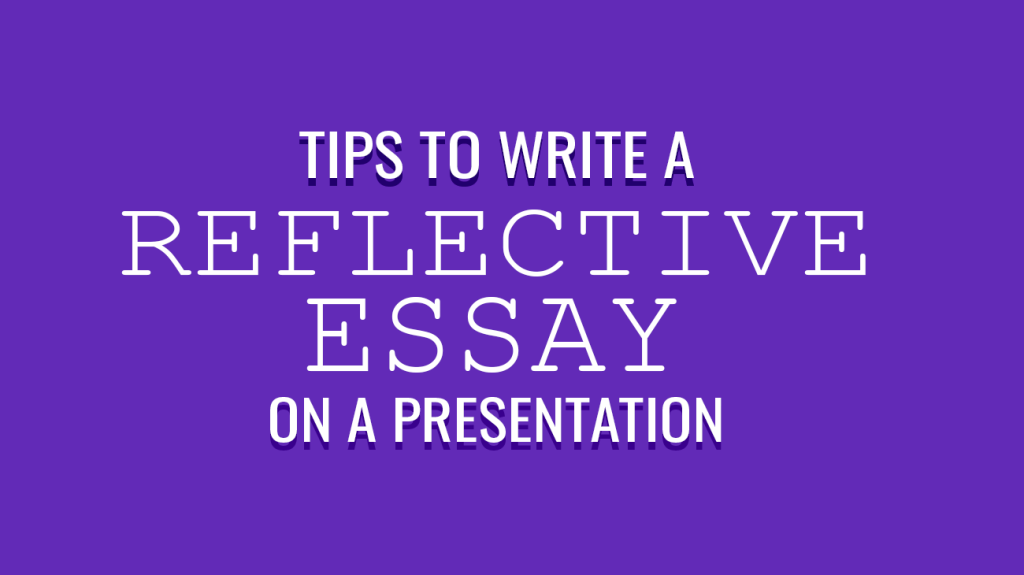
Reflective writing is an important skill that helps people think about their experiences and share their thoughts and feelings about something special. When we reflect on a presentation, like a group project, a lecture, or a talk we gave, it’s essential to know how to write a great reflective essay.
Here we will provide helpful tips and guidelines to assist you in writing an effective and meaningful reflective essay on a presentation. By following these suggestions, you’ll be able to express your thoughts and reflections in a clear and powerful way. Let’s explore the key aspects of writing a perfect reflective paper on a presentation .

Reflective Writing on Presentation – Key Steps and Ideas
Reflective writing on presentation involves looking closely at the experience of the presentation and analyzing how it has influenced your learning and personal growth. Here are some helpful tips to assist you throughout the reflective writing process:
- Understand the purpose: Before you begin writing your reflective essay, take some time to comprehend the purpose of the presentation and the goals you aimed to achieve. Consider who the intended audience was, what the topic was, and the objectives set for the presentation.
- Recall the presentation: Take a moment to reflect on the presentation itself. Think about the content, structure, and delivery of the presentation. Consider its strengths and weaknesses, the challenges you encountered, and the overall effectiveness of the presentation.
- Identify key learnings: Reflect on what you have learned from the presentation. Did it help you gain a better understanding of the topic? Did it challenge your existing knowledge or beliefs? Identify the significant insights or new perspectives you gained through the presentation.
- Analyze your performance: Evaluate your own performance as a presenter or group member. Assess your presentation skills, such as how well you communicated, organized, and engaged with the audience. Reflect on the aspects that went well and areas where you could improve.
- Connect personal experiences: Relate the presentation to your own experiences, knowledge, or values. Did the topic resonate with you on a personal level? How did it connect to your life or previous experiences? Reflect on the significance of these connections and how they influenced your understanding or perspective.
- Consider different perspectives: Think about different viewpoints or opinions that were presented during the presentation. Did it challenge your own beliefs or expose you to alternative perspectives? Reflect on how these differing viewpoints affected your thinking and whether they prompted any changes in your own perspective.
- Reflect on the presentation’s impact: Consider the overall impact of the presentation on your learning and personal growth. Did it broaden your knowledge, sharpen specific skills, or inspire you in any way? Reflect on the lasting effects the presentation had on you and how it may influence your future endeavors.
- Use examples and evidence: Support your reflections with specific examples and evidence from the presentation. This could include famous or motivational quotes, anecdotes, or references to specific moments or visuals. Using concrete examples strengthens your reflective essay and adds depth to your reflections.
- Express emotions and thoughts: Remember that reflective writing allows you to express your emotions and thoughts freely. Don’t shy away from sharing how the presentation made you feel or the thoughts that arose during and after the presentation. Reflect on the emotional impact and its significance to your overall experience.
Try to Write a Perfect Reflective Essay on a Presentation
Writing a perfect reflective essay requires careful consideration of the structure and content. Follow these tips to ensure your essay is well-crafted:
- Introduction: Begin your essay with a brief introduction that provides context for the presentation. Mention the topic, purpose, and any relevant background information.
- Body paragraphs: Organize your essay into several paragraphs, each focusing on a specific aspect of the presentation. Use clear subheadings to guide the reader. Here are some suggested subheadings:
- Presentation Overview: Provide a summary of the presentation , including the format (oral, video, PowerPoint presentation), the topic, and the main points covered.
- Personal Reflection: Share your personal thoughts and feelings about the presentation. Discuss how it impacted you, what you found most interesting or challenging, and any personal connections you made.
- Learning Outcomes: Reflect on the knowledge and skills you acquired or developed as a result of the presentation. Discuss how the presentation contributed to your learning and any changes in your perspective or understanding.
- Strengths and Weaknesses: Analyze the strengths and weaknesses of the presentation. Evaluate the effectiveness of the content, delivery, visuals, and overall organization.
- Group Dynamics (if applicable): If the presentation was a group project, reflect on the dynamics within the group. Discuss how the group worked together, the challenges faced, and any lessons learned from collaborating with others.
- Use examples: To support your reflection, provide specific examples and anecdotes from the presentation. Use these examples to illustrate your points and provide evidence for your reflections.
- Conclusion: Conclude your essay by summarizing the key insights and learnings from the presentation. Reflect on how the experience has contributed to your personal and academic growth.
Enhance Your Skills with Valuable Guidance
Students can find a wealth of advice and tips on writing a reflective essay on a presentation from various sources. Here are some places where they can seek guidance and support:
- Academic Writing Centers: Many educational institutions have writing centers that assist students. These centers provide resources, workshops, and one-on-one consultations where students can receive guidance on reflective writing and essay composition. One specific example of an academic writing center is the Writing Center at Harvard University .
- Online Writing Resources: There are numerous websites and online platforms dedicated to providing writing tips and guidelines. These resources often include step-by-step guides, sample essays, and explanatory videos that can help students understand the process of writing a reflective essay on a presentation. Purdue Online Writing Lab (OWL) is a prominent example of an online platform dedicated to providing writing tips and guidelines.
- Writing Guides and Books: Students can also refer to writing guides and books that focus on reflective writing. These resources provide comprehensive information on various aspects of reflective writing, including structuring an essay, using appropriate language, and analyzing experiences.
- Online Forums and Communities: Participating in online forums and communities dedicated to academic writing can be beneficial. Students can engage with peers and experts in discussions, ask questions, and seek advice specific to their reflective essay on a presentation.
- Professional Writing Services: In some cases, students may choose to get help from a trustworthy essay writing service which offers personalized support and guidance, helping students develop their reflective essays effectively. While this website offers professional writing assistance, it can also be a valuable tool in helping students solve the problem of crafting a reflective essay on a presentation.
- Al Tools for Enhanced Writing: In the digital age, AI-driven tools are crucial for students. Paraphrasing tools assist in rephrasing sentences without altering their meaning, helping to avoid plagiarism. However, they should be used judiciously. Grammar checkers, like Grammarly or grammarcheck, identify and rectify errors, ensuring polished and error-free essays. Using these tools enhances the quality of student writing.
Avoid Common Reflective Essay Mistakes
When writing a reflective essay on a presentation, it is important to avoid some common mistakes that can hinder the effectiveness of your essay. Here are a few key mistakes to avoid:
- Superficial Reflection: Avoid providing a shallow or superficial reflection on the presentation. Instead, strive to delve deeper into your thoughts, feelings, and insights regarding the experience. Be thoughtful and introspective in your analysis.
- Lack of Structure: Avoid writing the essay without a clear structure. Ensure your essay has an introduction, body paragraphs, and a conclusion. This will help you present your ideas in a logical and organized manner.
- Focusing Only on the Positive: Avoid solely focusing on the positive aspects of the presentation. Reflect on both the strengths and weaknesses of the presentation, as well as the challenges faced. This will demonstrate a more balanced and critical reflection.
- Neglecting Personal Growth: Don’t forget to discuss how the presentation has contributed to your personal growth and learning. Reflect on how the experience has influenced your knowledge, perspectives, and skills.
By avoiding these mistakes and striving for a thoughtful, well-structured, balanced, and growth-oriented reflection, you can enhance the quality and impact of your reflective essay on a presentation.
Browse Templates
- Best PowerPoint Templates
- Accounting & Finance
- Corporate Strategy
- Health & Medical Services
- Entertainment
Popular Topics
Related blog posts.
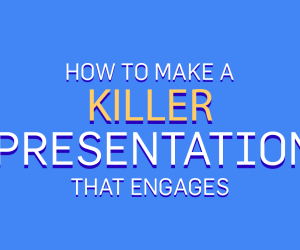
How to Make a Killer Presentation that Engage Audience (with Actionable Tips)

Using PowerPoint In Education and Essay Writing
8 tips for making effective powerpoint presentations for college students.

How to Embed a Video in PowerPoint: Supported Formats, Tips & Tricks
Our Awesome Intercultural Community
The story of us: eapp 8385 spring 16.

Self Reflection on 1st Presentation
Self-Critique of my first presentation Presenter: Drilona Aliu
Description of Experience
Since I was the last one to present in class, I had the advantage of seeing everyone else presenting and catching on their strategies. It seemed that all the previous presenters were very comfortable on presenting and they rarely showed any sign on nervousness. Usually, I am able to control my nervousness by giving a “talk” to myself and I imagine myself as the subject matter expert. By having these positive thoughts in my mind, I am able to control nervousness that may be created as a result of the fear of talking in front of people and sharing something very personal such as part of my childhood.
The most challenging aspect of this presentation was creating a meaningful story through an effective framework that would transmit my emotions as a child and my journey to learn English. I find it very challenging when I have a lot to share but do not know how to properly deliver my message in a logical order. While watching the DVD, I was able to identify that this challenge was evident although I tried to hide it as I was speaking. The most surprising aspect of my speech was that I used a lot of facial expressions. This might have always been the case but because I never watched myself presenting I have not been able to identify this habit. I could have done better in certain areas such as volume and speech rate, but I believe that I gave a good overall impression.
I believe that my first speech was effective and kept the audience interested. There is more room to improve upon the introduction and conclusion such as engaging the audience in my opening question: As a child, what did you want to be when you grew up? Such questions are always a good way to start the speech as it keeps the audience interested. I also think that due to time management constraints, I could have done a better job on the conclusion such as ending my speech how this journey affected the path I chose in life. This would “justify” how English has played a role in my life and how he has influenced my personal and professional growth.
I believe that my delivery was generally clear and organized; however, while watching the DVD I noticed that I need to work more on the speech flow and find effective ways to engage the audience. My posture and eye contact were good but I definitely need to work on my speech rate, such as making more pauses so the audience is able to “digest” the information provided and not feel overwhelmed with the amount of the information at a fast pace. I also think I “overdid” my hand gestures and this is something that I need to improve. Being from the Balkan region, it is part of our culture to excessively use hands when we talk. We are very expressive that way and that may be distracting for many people in the audience. There is also room for eliminating fillers such as um as I tend to use them quite a bit, especially in the beginning of my speech.
Overall, I believe that I have many strengths such as the ability to speak without feeling overwhelmed or very nervous, to quickly think and avoid mistakes without getting frustrated (mistakes are for human beings), and to deliver my speech with effective voice projection and eye contact. The main areas for improvement would be to engage the audience as they may relate more to my speech, use fewer facial and hand gestures, speak at a slower pace and make appropriate pauses, and use fewer fillers throughout the speech.
As a result, my goals to improve in public speaking are:
- Effectively organize and clearly deliver my main points. Each main point should be backed up with effective supporting points and examples to make it more illustrative for the audience. The steps I would take to improve on this goal are to develop a detailed speech outline and rehearse it several times while timing itso I do not run out of time.
- Improve my speech rate. I tend to talk too fast and make very few or short pauses. It is my goal to improve my speaking pace so the audience will be able to follow it better. This can be achieved through multiple rehearsals and ability to select only worthy arguments (quantity vs quality).
- Last but not least is hand gesture control. Watching myself on the DVD made me realize that I use my hands a lot when I speak and sometimes that can be distracting for the audience. I need to work on using my hand gestures appropriately and a way to improve that is through recording myself every time I deliver a speech and reviewing it as that is something I do unconsciously.
There are many other things to improve and I am confident that I will be able to incorporate these changes in my next presentation!

- Create a Site
- Search Sites
Reflecting on Group Presentation with Rolfe’s Reflective Cycle Essay
Over the course of the last decade, reflective practice in the advancement of knowledge in a plethora of areas, including business, education, social work, and healthcare, has been becoming continuously more widespread. Patel and Metersky (2021) state that reflection is considered to improve learning, which is why it is so popular in so many spheres. According to Schwind and Manankil-Rankin (2020), deliberate reflection on any experience gives meaning to people’s three ways: of being, knowing, and doing (or, alternatively, ontology, epistemology, and praxis). When it comes to the most widely used reflective models, Rolfe’s reflective cycle is one of these, and it is deemed applicable in any context due to its clarity and subsequent ease of employment (Galutira, 2018). The following reflective essay uses this model to guide my thinking about teamwork, leadership, and time management in relation to creating a group Powerpoint presentation. The aims of this essay are to evaluate the experience of such a type of work and to describe how the things I have learned can be applied to my future nursing practice.
Rolfe’s reflective cycle is a reflective model created to help people assess their experiences or empirical learning activities. In terms of group and teamwork, Rolfe’s model is an effective tool for each member to evaluate how they can improve their teamwork skills ( Use the ‘What? So what? Now what?’ model, no date). This method’s history dates back to the 1970s when an American schoolteacher Terry Borton wrote a book in which he proposed a reflective practice framework founded on three questions: what? so what? and now what?
Borton’s scheme was adapted for clinical use by John Driscoll, although his version could be implemented in various disciplines. In addition to that, Rolfe et al. took Borton’s model and refined it further for use in a clinical setting and pastoral work ( What? So what? Now what? model of reflection , no date). Rolfe and his colleagues left the structure of Borton’s scheme unchanged but expanded each question to include extra questions to stimulate deeper reflection. As stated by Business Bliss Consultants FZE (2018), this is aimed at increasing self-awareness, analysis skills, and skills of problem-solving. The ‘what?’ phase of Rolfe’s model contains questions to help objectively review what took place. The ‘so what?’ phase is a more subjective study of the consequences. Finally, the ‘now what?’ phase is a look at the way the lessons learned can be beneficial for the future.
I believe that the main reason why my group succeeded in creating a presentation without major quarrels or disagreements was because of our good teamwork, which was due to the strategy we all agreed upon for the working process. This strategy consisted of having each member of the team assigned a specific task in the beginning based on what each person is good at – for instance, finding appropriate references, doing research, or creating presentations. We communicated to check where everyone was with their part of the work every week. However, it would have been harder to do had our group been larger; but since there were five of us, communication was effective, and each person’s voice was always heard. To interact with one another, we created a WhatsApp group chat, and while it proved to be productive, we still felt that a lack of face-to-face meetings was a significant drawback. Moreover, for our work to be more organized, we selected a team leader, Wendy, who was chosen due to her having had experience with working in groups and making presentations before.
In addition to that, one unfortunate circumstance that I found myself facing was my poor time management skills. It seems that I had initially underestimated the amount of work it would take for me to finish my part of the task. As a result, in the final stages of preparation, I worked for hours in the end and felt exhausted when it was done. However, since our group scored an A, I consider it all to have been worth it.
What this experience tells me about myself is that I have to be less confident when approaching such tasks and put more effort into planning how, when, and what exactly to do. This is especially important when working in groups or teams because other people rely on you to do your work efficiently and timely. Academic literature on effective team communication points at the necessity of each member of the team to feel that they are responsible for the final outcome (Harris and Sherblom, 2018). In addition to that, according to Marlow et al. (2018), when it comes to a successful group, it is not the frequency of communication but its quality that matters. It explains why us discussing things in a group chat once a week was more than enough for the eventual success of the project.
Moreover, this experience taught me that for group work to be productive, there must be a leader in a team. As I have mentioned earlier, we appointed Wendy to be our leader, and I believe that had it not been for her, it would have been more difficult for us to make progress. As per Northouse (2021), a true leader is someone who is focused on developing others, leads by example, and ensures that the communication between team members is effective. All of this is about Wendy, who was an inspiration for all of us to aim to work harder and was always there to help anyone who struggled with anything.
I believe that I have learned a lot from working on this project with my peers. First of all, for the sake of not only my mental health but also other people succeeding, I plan to start working on my time management skills. In addition to that, I will ensure that I remember everything that I have learned about group work and apply it to the next team project in which I will participate. In terms of how I can apply the reflections on our work to my future nursing practice, I now have an understanding of how to be an effective team player and a good leader. Both of these qualities are important to deliver safe and high-quality nursing care, which is my, and every other nurse’s, ultimate goal.
In conclusion, reflective practice is essential to improving learning and evaluating one’s skills for future development. One of the most effective and popular reflective models is Rolfe’s reflective cycle, which is based on a person asking themselves three simple questions: what? so what, and now what? When expanded into a series of additional queries, these give one an opportunity to analyze their work and think of ways to enhance it. I applied it in assessing the work of my group on a presentation and found that it is extremely efficient in supplying one with food for thought and identifying benefits and drawbacks. I will use the knowledge that I have gained from working with this reflective model in my future nursing practice to be a great team player and a successful leader.
Reference List
Business Bliss Consultants FZE (2018) Rolfe’s reflective cycle . Web.
Galutira, G.D. (2018) ‘Theory of reflective practice in nursing’, International Journal of Nursing Science , 8(3), pp. 51-56.
Harris, T.E. and Sherblom, J.C. (2018) Small group and team communication . Waveland Press.
Marlow, S.L., Lacerenza, C.N., Paoletti, J., Burke, C.S. and Salas, E. (2018) ‘Does team communication represent a one-size-fits-all approach?: a meta-analysis of team communication and performance’, Organizational Behavior and Human Decision Processes , 144, pp.145-170.
Northouse, P.G. (2021) Leadership: theory and practice . Sage Publications.
Patel, K.M. and Metersky, K. (2021) ‘Reflective practice in nursing: a concept analysis’, International Journal of Nursing Knowledge , 33(3), pp. 180-187.
Schwind, J. K. and Manankil-Rankin, L. (2020) ‘Using narrative reflective process to augment personal and aesthetic ways of knowing to support holistic person-centred relational practice’, Reflective Practice , 21(4), pp. 473–483.
Use the ‘What? So what? Now what?’ model: a great example of reflective questioning (no date). Web.
What? So what? Now what? model of reflection (no date). Web.
- Chicago (A-D)
- Chicago (N-B)
IvyPanda. (2023, September 24). Reflecting on Group Presentation with Rolfe's Reflective Cycle. https://ivypanda.com/essays/reflecting-on-group-presentation-with-rolfes-reflective-cycle/
"Reflecting on Group Presentation with Rolfe's Reflective Cycle." IvyPanda , 24 Sept. 2023, ivypanda.com/essays/reflecting-on-group-presentation-with-rolfes-reflective-cycle/.
IvyPanda . (2023) 'Reflecting on Group Presentation with Rolfe's Reflective Cycle'. 24 September.
IvyPanda . 2023. "Reflecting on Group Presentation with Rolfe's Reflective Cycle." September 24, 2023. https://ivypanda.com/essays/reflecting-on-group-presentation-with-rolfes-reflective-cycle/.
1. IvyPanda . "Reflecting on Group Presentation with Rolfe's Reflective Cycle." September 24, 2023. https://ivypanda.com/essays/reflecting-on-group-presentation-with-rolfes-reflective-cycle/.
Bibliography
IvyPanda . "Reflecting on Group Presentation with Rolfe's Reflective Cycle." September 24, 2023. https://ivypanda.com/essays/reflecting-on-group-presentation-with-rolfes-reflective-cycle/.
- Writing a Research Using Rolfe Reflective Model
- Group Dynamics Reflection with Rolfe et al.'s Model
- "A Rose for Emily" and "Letter of John Rolfe"
- Gibbs’s Reflective Cycle and Borton’s Model of Reflection
- The Heartbreaking Story of Pocahontas Life
- Virginia Colony: English and Native Americans
- An Event That Breaches a Professional Boundary
- Wendy’s Restaurant Vice President of Operations
- Visual Persuasion in Wendy's Advertisement
- Operations Strategy: Wendy's Restaurant
- Professional Communication: "Brick by Brick" by Douglas
- Speech Preparation Outline: Importance of Taking Public Speaking Classes
- How to Communicate Ethically in the Digital World
- Mobile Communication Device Etiquette
- Human Interaction Face-to-Face and Online

Student Presentation Reflections

Teachers as Paragons
I struggle with articulating this point, but for the purposes of this post, I think that the most valid student-teacher dynamic is not the Jedi Master and Padawan method, but instead one where a teacher serves as a paragon of a small set of skills/attributes and the student’s role is to assimilate their experiences with all of their teachers into their own paradigm.
While this viewpoint is not revolutionary, I find that hubris often prevents a teacher from maximizing the benefit of this approach. Too often I find myself or my peers trying to be too many things to too many students. I think it is important for a teacher to make explicit commitments about which skill or attribute they wish to be the avatar for.
I chose presentation skills as my niche of instruction because I benefited greatly from the Public Speaking and Speech and Debate classes I took in high school. When I was in college, I saw very clearly those of my peers who did not have those same opportunities. I vowed that my students would be afforded opportunities to develop their presentation skills in my class no matter the other classes offered by my school.

Reflection Process
I plan on creating many posts about the different resources, examples, and assignments that I use to improve my students’ presentation skills. One of the core strategies, and I believe the most powerful, that I use to improve student presentations is a presentation reflection process.
In order to make presentation reflections be a valid assignment, you must film your students as they present—something that my 11th grade Public Speaking teacher Mrs. Shank did for me 15 years ago. Admittedly, being filmed for a presentation was nerve-wracking; however, it was also amazing beneficial. However, instead of recording presentations on VHS cassette like Mrs. Shank did, I record presentations digitally and post them as unlisted YouTube videos .
Recording Presentations
Do yourself a favor and make sure that you use a tripod to record the student presentations. You might think you can cobble together books and tape to hold a camera steady, but this is the wrong call.
- If you plan on using your phone as the camera, you will need a mount to attach it to your tripod , and an improved microphone will certainly help with the audio quality, but it’s not necessary.
- If you plan on using a DSLR or mirrorless camera, then you really need to improve the audio. To improve the quality of the video’s captured sound, I suggest using a shotgun microphone .
Whatever hardware you use, it is important to share with the students the camera’s field of view, so they know where they should stand. The reflection assignment is much harder if the student does not appear on camera.
Reflection Assignment
Recording the presentation is the first step, but students will need to thoughtfully watch their presentations to see areas for improvement. To guide the students’ thoughts while they watch their presentation video, I developed three sequential reflection assignments, one for each of the major presentations in my class.
This reflection process is truly eye-opening. Students are routinely shocked when they watch the video and see the nervous fidgeting or hand-wringing that they swear never happened. The pedagogical impact of a student watching themselves on video is many times more powerful than even the most helpful rubric or feedback.
In addition to reflecting on what happened, an important part of the assignment is also identifying five points on which to improve and coming up with action items for each point. An example of an improvement point and an action item would be:
- I will look up the phonetic pronunciation of the words ahead of time and practice saying them to my teacher.
I always assign this as homework and give students a week to do the assignment after their presentation. I try very hard to make sure the videos get processed, uploaded, and shared with the students as soon as possible to make sure that things are fresh in their mind.
Students sometimes balk at the number of words they have to write. However, since they are writing semi-informally about themselves and have a video to go off, students routinely surpass 1000 words without blinking an eye.
Sometimes when I explain presentation reflections to teachers, they exclaim that it is too much work for them to do or they don’t know how to do the “video stuff” or something else along those lines. The video recording/editing process can be as basic or as advanced as you want it to be. Since video editing is a core part of my multimedia business, there is a lot of stuff that I do to the videos that is unnecessary but a point of pride for me.
In all honesty, a perfectly functional presentation video takes less than 3 minutes more than the presentation itself. Whether you spend 3 minutes or 30 minutes editing a presentation video, that time is returned many-fold by the presentation skill increase of your students.
Hands down, the most consistent piece of feedback I receive from alumni is that they dominate their presentations in college. This makes me very proud. I committed to developing presentation skills in my students since my very first year of teaching. Hearing back from alumni that they are drastically better than their peers at presenting puts a smile on my face every time.
You might also like

Leave a Reply
Leave a reply cancel reply.
Your email address will not be published. Required fields are marked *
Notify me of follow-up comments by email.
Notify me of new posts by email.
This site uses Akismet to reduce spam. Learn how your comment data is processed .

How to Write a Reflective Essay: Easy Guide with Pro Tips

Defining What is a Reflective Essay: Purpose + Importance
Being present is a cornerstone of mindfulness and meditation. You must have often heard that staying in the moment helps you appreciate your surroundings, connects you with people and nature, and allows you to feel whatever emotions you must feel without anxiety. While this is helpful advice as you become more focused and avoid getting lost in thought, how can you truly appreciate the present without reflecting on your past experiences that have led you to the current moment?
We don't say that you should dwell on the past and get carried away with a constant thought process, but hey, hear us out - practice reflective thinking! Think back on your previous life events, paint a true picture of history, and make connections to your present self. This requires you to get a bit analytical and creative. So you might as well document your critical reflection on a piece of paper and give direction to your personal observations. That's when the need for reflective essays steps in!
In a reflective essay, you open up about your thoughts and emotions to uncover your mindset, personality, traits of character, and background. Your reflective essay should include a description of the experience/literature piece as well as explanations of your thoughts, feelings, and reactions. In this article, our essay writer service will share our ultimate guide on how to write a reflective essay with a clear format and reflective essay examples that will inspire you.
How to Write a Reflective Essay with a Proper Reflective Essay Outline
To give you a clear idea of structuring a reflective essay template, we broke down the essential steps below. Primarily, the organization of a reflective essay is very similar to other types of papers. However, our custom writers got more specific with the reflective essay outline to ease your writing process.
Reflective Essay Introduction
When wondering how to start a reflective essay, it is no surprise that you should begin writing your paper with an introductory paragraph. So, what's new and different with the reflection essay introduction? Let's dissect:
- Open your intro with an attention-seizing hook that engages your audience into reflective thinking with you. It can be something like: 'As I was sitting on my bed with my notebook placed on my shaky lap waiting for the letter of acceptance, I could not help but reflect, was enrolling in college the path I wanted to take in the future?'
- Provide context with a quick overview of the reflective essay topic. Don't reveal too much information at the start to prevent your audience from becoming discouraged to continue reading.
- Make a claim with a strong reflective essay thesis statement. It should be a simple explanation of the essay's main point, in this example, a specific event that had a big impact on you.
Reflective Essay Body Paragraphs
The next step is to develop the body of your essay. This section of the paper may be the most challenging because it's simple to ramble and replicate yourself both in the outline and the actual writing. Planning the body properly requires a lot of time and work, and the following advice can assist you in doing this effectively:
- Consider using a sequential strategy. This entails reviewing everything you wish to discuss in the order it occurred. This method ensures that your work is structured and cohesive.
- Make sure the body paragraph is well-rounded and employs the right amount of analysis. The body should go into the effects of the event on your life and the insights you've gained as a consequence.
- Prioritize reflecting rather than summarizing your points. In addition to giving readers insight into your personal experience, a reflective stance will also show off your personality and demonstrate your ability to handle certain challenges.
Reflective Essay Conclusion
The goal of your reflective essay conclusion should be to tie everything together by summarizing the key ideas raised throughout, as well as the lessons you were able to take away from experience.
- Don't forget to include the reasons for and the methods used to improve your beliefs and actions. Think about how your personality and skills have changed as well.
- What conclusions can you draw about your behavior in particular circumstances? What could you do differently if the conditions were the same in the future?
Remember that your instructor will be searching for clear signs of reflection.
Understanding a Reflection Paper Format
The format of reflective essay greatly differs from an argumentative or research paper. A reflective essay is more of a well-structured story or a diary entry rife with insight and reflection. You might be required to arrange your essay using the APA style or the MLA format.
And the typical reflection paper length varies between 300 and 700 words, but ask your instructor about the word length if it was assigned to you. Even though this essay is about you, try to avoid too much informal language.
If your instructor asks you to use an APA or MLA style format for reflective essay, here are a few shortcuts:
Reflective Essay in MLA Format
- Times New Roman 12pt font double spaced;
- 1" margins;
- The top right includes the last name and page number on every page;
- Titles are centered;
- The header should include your name, your professor's name, course number, and the date (dd/mm/yy);
- The last page includes a Works Cited.
Reflective Essay in APA Style
- Include a page header on the top of every page;
- Insert page number on the right;
- Your reflective essay should be divided into four parts: Title Page, Abstract, Main Body, and References.
Reflective Essay Writing Tips
You may think we've armed you with enough tips and pointers for reflective writing, but it doesn't stop here. Below we gathered some expert-approved tips for constructing uncontested reflection papers.

- Be as detailed as possible while writing. To make your reflective essay writing come to life, you should employ several tactics such as symbolism, sentence patterns, etc.
- Keep your audience in mind. The reader will become frustrated if you continue writing in the first person without taking a moment to convey something more important, even though you will likely speak about something from your own perspective.
- Put forth the effort to allow the reader to feel the situation or emotion you are attempting to explain.
- Don't preach; demonstrate. Instead of just reporting what happened, use description appropriately to paint a clear picture of the event or sensation.
- Plan the wording and structure of your reflective essay around a central emotion or subject, such as joy, pleasure, fear, or grief.
- Avoid adding dull elements that can lessen the effect of your work. Why include it if it won't enhance the emotion or understanding you wish to convey?
- There must be a constant sense of progression. Consider whether the event has transformed you or others around you.
- Remember to double-check your grammar, syntax, and spelling.
Ready to Shine a Light on Your Innermost Thoughts?
Order your reflection essays now and let a wider audience hear your unique story
Reflective Essay Topic Ideas
As a reflective essay should be about your own views and experiences, you generally can't use someone else's ideas. But to help you get started, here are some suggestions for writing topics:
- An experience you will never forget.
- The moment you overcame a fear.
- The most difficult choice you had to make.
- A time your beliefs were challenged.
- A time something changed your life.
- The happiest or most frightening moment of your life so far.
- Ways you think you or people can make the world a better place.
- A time you felt lost.
- An introspective look at your choices or a time you made the wrong choice.
- A moment in your life you would like to relive.
You may find it convenient to create a chart or table to keep track of your ideas. Split your chart into three parts:

- In the first column, write key experiences or your main points. You can arrange them from most important to least important.
- In the second column, list your response to the points you stated in the first column.
- In the third column, write what, from your response, you would like to share in the essay.
Meanwhile, if you're about to enroll in your dream university and your mind is constantly occupied with - 'how to write my college admissions essay?', order an academic essay on our platform to free you of unnecessary anxiety.
Reflective Essay Sample
Referring to reflective essay examples can help you a lot. A reflective essay sample can provide you with useful insight into how your essay should look like. You can also buy an essay online if you need one customized to your specific requirements.

How to Conclude a Reflective Essay
As we come to an end, it's only logical to reflect on the main points discussed above in the article. By now, you should clearly understand what is a reflective essay and that the key to writing a reflective essay is demonstrating what lessons you have taken away from your experiences and why and how these lessons have shaped you. It should also have a clear reflective essay format, with an opening, development of ideas, and resolution.
Now that you have the tools to create a thorough and accurate reflective paper, you might want to hand over other tasks like writing definition essay examples to our experienced writers. In this case, feel free to buy an essay online on our platform and reflect on your past events without worrying about future assignments!
Want to Easily Impress Your Professors?
Count on the support of our professional writers for a top-notch academic paper
Related Articles
.webp)
We use cookies and similar technologies to improve your website experience and help us understand how you use our website. By continuing to use this website, you consent to the usage of cookies. Learn more about our Privacy Statement and Cookie Policy .
- Our Mission
- Code of Conduct
- The Consultants
- Hours and Locations
- Apply to Become a Consultant
- Make an Appointment
- Face-to-Face Appointments
- Zoom Appointments
- Written Feedback Appointments
- Support for Writers with Disabilities
- Policies and Restrictions
- Upcoming Workshops
- Class Workshops
- Meet the Consultants
- Writing Guides and Tools
- Schedule an appointment! Login or Register
- Graduate Students
- ESOL Students
Reflective Essays
What is a reflective essay? Typically, you write a reflective essay in response to a text you have read, an event you have attended, or another experience you have had. The essay focuses on describing the event, text, or other experience, discussing what you learned from it, and speculating on how you could apply what you learned.
Reflective essays are designed to stimulate your learning by asking you to think about (“reflect on”) what you learned from a particular text, event, or experience. The process of thinking consciously about your learning deepens and reinforces that learning.
Setting Yourself Up to Reflect
If you know in advance that you will be reflecting on a text or experience, take some time beforehand to set yourself up to reflect on it afterwards. Write down some notes about your expectations, as suggested by the questions below:
- What expectations do you have about the text, event, or experience? What do you expect it to be like? What do you expect to learn from it?
- Are there any questions you have at the outset?
- Is there any aspect of this text or experience that you expect to be challenging for you?
You can refer to these notes later, when you compose the reflection.
Engaging with the Text, Event, or Experience
As you are reading the text or participating in the experience, ask yourself these questions:
- Is it similar to or different from what you expected?
- How is it answering the questions you had at the outset?
- Is there anything you find to be challenging about this text, event, or experience?
- Are you engaged by the text, event, or experience? If so, what is engaging to you?
- What, if anything, do you think you are learning from this text, event, or experience?
In other words, think consciously about how the text, event, or experience meets your expectations, raises or answers questions, poses challenges, or provides an opportunity to learn.
Writing the Reflection
Now it’s time to write down your reflections. Remember that reflective essays are meant to deepen your thinking about a particular assignment or experience, so your own thoughts, feelings, and insights matter here.
A reflection can be divided into four phases, each of which can be a section of your essay:
- Describe: What was the text, event, or experience? If it was a text: who wrote it, and what was it about? If it was an event or experience: when did it occur; who was there; what went on?
- Interpret: How did the text, event, or experience meet your expectations (or not)? What questions did it raise for you? Was there anything you found to be particularly surprising, meaningful or challenging? If so, what was it?
- Evaluate: What did you learn from this text, event, or experience?
- Plan: How do you think you can use what you learned during this text, event, or experience in the future? In what situations could you use what you learned?
Style, Tone, Length
- A reflection is an essay, so provide full, thoughtful responses to the questions in your instructor’s prompt.
- The style and tone of your reflective essay should match the purpose of the overall assignment. This is a personal essay meant to showcase what you learned from the text, event, or experience that you are writing about. You can use the pronouns “I,” “me,” and “mine.”
- Describe the text, event, or experience fully, using plenty of descriptive words. Include enough detail for your audience to understand that you were engaged with the text, event, or experience that you are reflecting on; the reader should come away with the understanding that you learned something from the text, event, or experience you are writing about.
- Citations are only necessary if you are referring to a specific text, and even then, your citations are not the focus of the reflection. For a reflective essay, you are the main source of evidence. Always check with your instructor about what citation style to use, if relevant.
- The length of your reflection will depend on your instructor’s instructions for the assignment.
- The best source of information on length is your professor, so find out what the word or page-count is from them.
References
RMIT University Library Learning Lab. (n.d.). Writing an academic reflection. https://emedia.rmit.edu.au/learninglab/content/writing-academic-reflection
University of Birmingham. (2015). A short guide to reflective writing. https://intranet.birmingham.ac.uk/as/libraryservices/library/asc/documents/public/short-guide-reflective-writing.pdf

The Writing Center
4400 University Drive, 2G8 Fairfax, VA 22030
- Johnson Center, Room 227E
- +1-703-993-1200
- [email protected]
Quick Links
- Register with us
© Copyright 2024 George Mason University . All Rights Reserved. Privacy Statement | Accessibility

- Schools & departments

Structure of academic reflections
Guidance on the structure of academic reflections.
Academic reflections or reflective writing completed for assessment often require a clear structure. Contrary to some people’s belief, reflection is not just a personal diary talking about your day and your feelings.
Both the language and the structure are important for academic reflective writing. For the structure you want to mirror an academic essay closely. You want an introduction, a main body, and a conclusion.
Academic reflection will require you to both describe the context, analyse it, and make conclusions. However, there is not one set of rules for the proportion of your reflection that should be spent describing the context, and what proportion should be spent on analysing and concluding. That being said, as learning tends to happen when analysing and synthesising rather than describing, a good rule of thumb is to describe just enough such that the reader understands your context.
Example structure for academic reflections
Below is an example of how you might structure an academic reflection if you were given no other guidance and what each section might contain. Remember this is only a suggestion and you must consider what is appropriate for the task at hand and for you yourself.
Introduction
Identifies and introduces your experience or learning
- This can be a critical incident
- This can be the reflective prompt you were given
- A particular learning you have gained
When structuring your academic reflections it might make sense to start with what you have learned and then use the main body to evidence that learning, using specific experiences and events. Alternatively, start with the event and build up your argument. This is a question of personal preference – if you aren’t given explicit guidance you can ask the assessor if they have a preference, however both can work.
Highlights why it was important
- This can be suggesting why this event was important for the learning you gained
- This can be why the learning you gained will benefit you or why you appreciate it in your context
You might find that it is not natural to highlight the importance of an event before you have developed your argument for what you gained from it. It can be okay not to explicitly state the importance in the introduction, but leave it to develop throughout your reflection.
Outline key themes that will appear in the reflection (optional – but particularly relevant when answering a reflective prompt or essay)
- This can be an introduction to your argument, introducing the elements that you will explore, or that builds to the learning you have already gained.
This might not make sense if you are reflecting on a particular experience, but is extremely valuable if you are answering a reflective prompt or writing an essay that includes multiple learning points. A type of prompt or question that could particularly benefit from this would be ‘Reflect on how the skills and theory within this course have helped you meet the benchmark statements of your degree’
It can be helpful to explore one theme/learning per paragraph.
Explore experiences
- You should highlight and explore the experience you introduced in the introduction
- If you are building toward answering a reflective prompt, explore each relevant experience.
As reflection is centred around an individual’s personal experience, it is very important to make experiences a main component of reflection. This does not mean that the majority of the reflective piece should be on describing an event – in fact you should only describe enough such that the reader can follow your analysis.
Analyse and synthesise
- You should analyse each of your experiences and from them synthesise new learning
Depending on the requirements of the assessment, you may need to use theoretical literature in your analysis. Theoretical literature is a part of perspective taking which is relevant for reflection, and will happen as a part of your analysis.
Restate or state your learning
- Make a conclusion based on your analysis and synthesis.
- If you have many themes in your reflection, it can be helpful to restate them here.
Plan for the future
- Highlight and discuss how your new-found learnings will influence your future practice
Answer the question or prompt (if applicable)
- If you are answering an essay question or reflective prompt, make sure that your conclusion provides a succinct response using your main body as evidence.
Using a reflective model to structure academic reflections
You might recognise that most reflective models mirror this structure; that is why a lot of the reflective models can be really useful to structure reflective assignments. Models are naturally structured to focus on a single experience – if the assignment requires you to focus on multiple experiences, it can be helpful to simply repeat each step of a model for each experience.
One difference between the structure of reflective writing and the structure of models is that sometimes you may choose to present your learning in the introduction of a piece of writing, whereas models (given that they support working through the reflective process) will have learning appearing at later stages.
However, generally structuring a piece of academic writing around a reflective model will ensure that it involves the correct components, reads coherently and logically, as well as having an appropriate structure.
Reflective journals/diaries/blogs and other pieces of assessed reflection
The example structure above works particularly well for formal assignments such as reflective essays and reports. Reflective journal/blogs and other pieces of assessed reflections tend to be less formal both in language and structure, however you can easily adapt the structure for journals and other reflective assignments if you find that helpful.
That is, if you are asked to produce a reflective journal with multiple entries it will most often (always check with the person who issued the assignment) be a successful journal if each entry mirrors the structure above and the language highlighted in the section on academic language. However, often you can be less concerned with form when producing reflective journals/diaries.
When producing reflective journals, it is often okay to include your original reflection as long as you are comfortable with sharing the content with others, and that the information included is not too personal for an assessor to read.
Developed from:
Ryan, M., 2011. Improving reflective writing in higher education: a social semiotic perspective. Teaching in Higher Education, 16(1), 99-111.
University of Portsmouth, Department for Curriculum and Quality Enhancement (date unavailable). Reflective Writing: a basic introduction [online]. Portsmouth: University of Portsmouth.
Queen Margaret University, Effective Learning Service (date unavailable). Reflection. [online]. Edinburgh: Queen Margaret University.
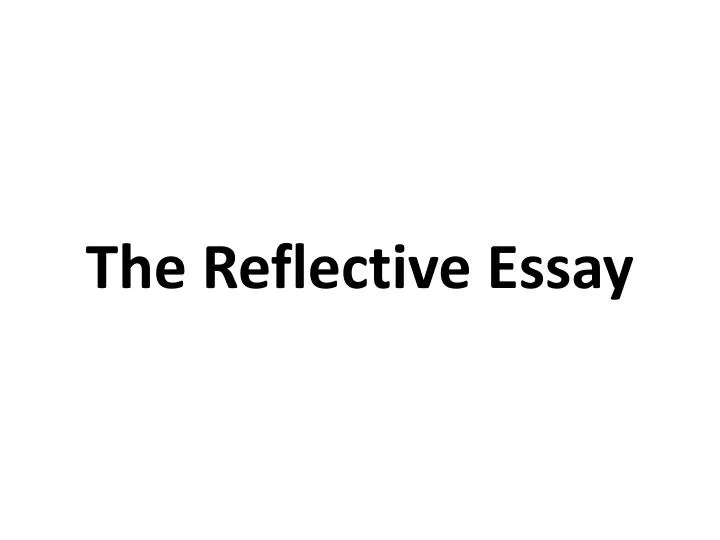
The Reflective Essay
Jul 29, 2014
200 likes | 770 Views
The Reflective Essay. Elements of a Reflective Essay. Purpose: explore the connection between a personal experience and what it says about your life and, beyond that, what it says about the meaning of being human
Share Presentation
- important part
- provide background
- reflection questions
- abstract ideas
- descriptive details

Presentation Transcript
Elements of a Reflective Essay • Purpose: explore the connection between a personal experience and what it says about your life and, beyond that, what it says about the meaning of being human • Your subject: an experience that leads you to think about abstract ideas such as love, patience, courage, honor, etc. • Your reflection on the experience should lead you to a new examination of your beliefs about life and/or what it means to be human.
Reflection Questions • How does/did the experience affect me? • Realized that I find some tattoos pretty • How did the experience change my attitudes or behavior? • I used to think tattoos were ugly, but now I realize I am being judgmental • What universal truth or insight into human existence did the experience teach me? • People are motivated by values and reasons that vary, and that is what makes us unique
Things to Keep in Mind • Think not only about the narrative – the events that occurred – but also about: • Descriptions of sights and sounds that contribute to your overall impression of the experience • Explanations of factual information that relate to an important part of your experience or to life in general
Putting it Together • Engage your reader’s attention • Provide background info necessary for understanding the experience • Hint at the significance or effect of the experience
Putting it Together: Middle • Use narrative and descriptive details to relate the events that make up the experience. • Effectively organize events, descriptions, and ideas. • Continue to hint at the meaning of the experience.
Putting it Together: End • Bring your telling of the experience to a close. • Reflect on the experience: reveal its significance for you or its effect on you. • Identify the insight into life the experience gave you.
- More by User
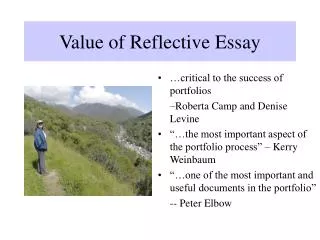
Value of Reflective Essay
Value of Reflective Essay. …critical to the success of portfolios –Roberta Camp and Denise Levine “…the most important aspect of the portfolio process” – Kerry Weinbaum “…one of the most important and useful documents in the portfolio” -- Peter Elbow. Value of the Reflective Essay.
252 views • 8 slides
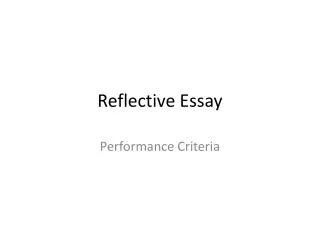
Reflective Essay
Reflective Essay. Performance Criteria. The Marking Process. Each piece of writing should first be read to establish whether it achieves success in all the Performance Criteria below, as well as ensuring that it is consistently technically accurate . Content
258 views • 7 slides

Reflective Essay. Writing an effective introduction. A few main methods. Begin like Amy Tan with what you are not “I am not a scholar of English or literature…” Begin in medias res (in the middle of things) “It was the 9 th inning, and I was up to bat…”
377 views • 5 slides
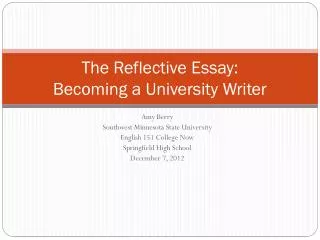
The Reflective Essay : Becoming a University Writer
The Reflective Essay : Becoming a University Writer. Amy Berry Southwest Minnesota State University English 151 College Now Springfield High School December 7, 2012. Freshman Writing, or Welcome to the University ‘Discourse Community’.
255 views • 13 slides

The Reflective Essay Created by: Prof. I. Cortés
The Reflective Essay Created by: Prof. I. Cortés. Center for Language Development Across the Disciplines. What is an Essay?. An ESSAY is a “short piece of writing on a particular subject” (Broukal 2010). Such essay could be: Argumentative Analytical Expository Reflective.
541 views • 29 slides
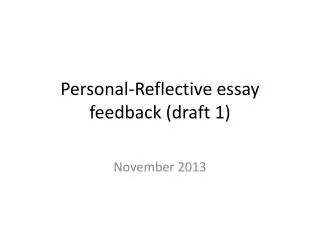
Personal-Reflective essay feedback (draft 1)
Personal-Reflective essay feedback (draft 1). November 2013. Key. MD = go into more detail. STO = too much storytelling. DFT = describe your thoughts and feelings. ETF = explain your thoughts and feelings. Remember! Length must be between 650-1300 words.
149 views • 6 slides

Reflective Essay. Peer editing for perfection!. Before we begin. Pass your paper to the person in front of you. Follow the instructions on the PPT Please make your marks and comments NEATLY This is to help each other catch mistakes. Step 1.
287 views • 12 slides
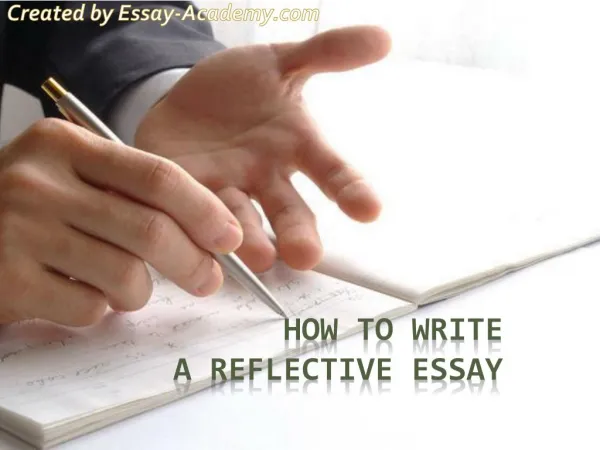
How to Write a Reflective Essay
This presentation will be helpful in case you need to write a Reflective Essay. As you understand it is an essay about your life adventure which should be very interesting to read. The link to the article will help you as well https://essay-academy.com/account/blog/how-to-write-a-reflective-essay
527 views • 12 slides
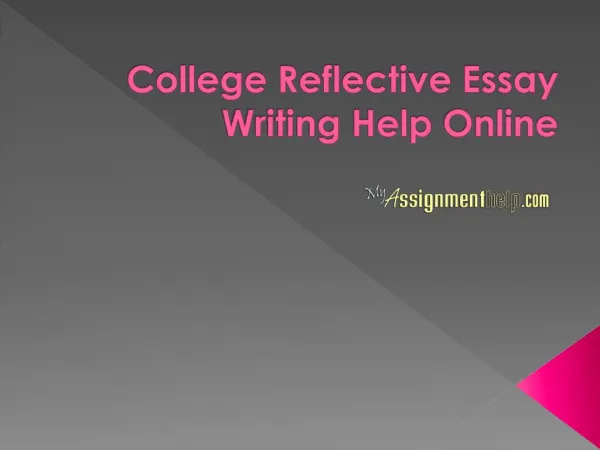
College Reflective Essay Writing Help Online
Avail expert help from MyAssignmenthelp.com to write A-one college reflective essays at affordable price according to your college guidelines. For more info visit: https://myassignmenthelp.com/essay-help/reflective-essay.html
176 views • 6 slides

Reflective Essay. A draft of the assignment description is on the course web page. Your reflective essay will be evaluated according to the criteria in the portfolio scoring guide.
86 views • 6 slides
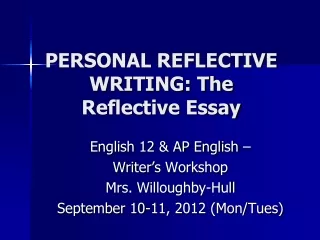
PERSONAL REFLECTIVE WRITING: The Reflective Essay
PERSONAL REFLECTIVE WRITING: The Reflective Essay. English 12 & AP English – Writer ’ s Workshop Mrs. Willoughby-Hull September 10-11, 2012 (Mon/Tues). What is Reflective Writing. Sharing your experience . . .
717 views • 61 slides
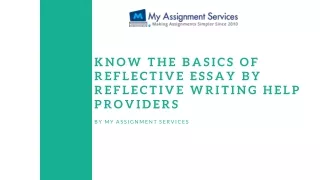
Know The Basics Of Reflective Essay By Reflective Writing Help Providers
When scholars get stuck in between while writing a reflective essay, there are many academic assistants in Australia who are round the clock there to help them out. https://www.myassignmentservices.com/reflective-writing-help.html
79 views • 6 slides
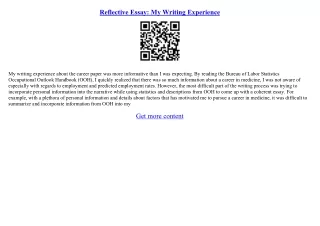
writing reflective essay
203 views • 20 slides

reflective essay titles
>>> How to write an essay? Order on the website: HelpWriting.Net <<< Reflective Essay, My Reflective Essay, Reflective Essay, Hrm Reflective Essay, Reflective Essay English, Reflective Essay Title
76 views • 7 slides
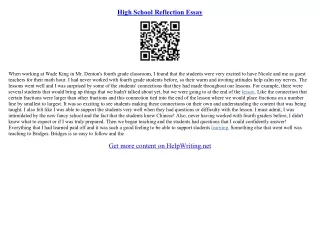
high school reflective essay
>>> How to write an essay? Order on the website: HelpWriting.Net <<< High School Reflection Essay, Statement Of Purpose: Partnership For The Future, Reflection In High School Writing, Pittsfield High School: Reflective Essay, Reflective Essay On High School Education, Self Reflection Paper For High School, High School Reflection Essay, Reflective Essay: Diversity In Public High School, High School Reflection Paper, High School Reflection Essay, High School Reflection Paper, Reflective Essay For Middle School, Reflective Essay-Writing In High School, High School Reflection Paper, Reflection Ess
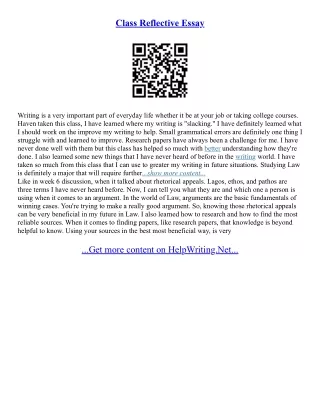
Reflective Essay On English Class
>>> How to write an essay? Order on the website: HelpWriting.Net <<< Class Reflective Essay
3 views • 1 slides
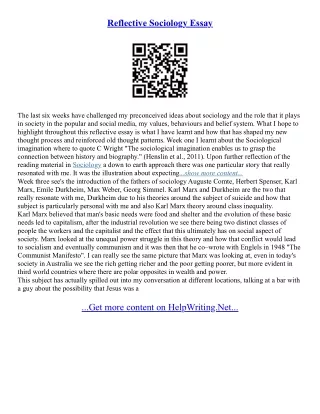
Sample Of Reflective Writing Essay
>>> How to write an essay? Order on the website: HelpWriting.Net <<< Reflective Sociology Essay, Reflective Letter Sample, Sample Reflective Essay, Reflective Literature Review
5 views • 7 slides
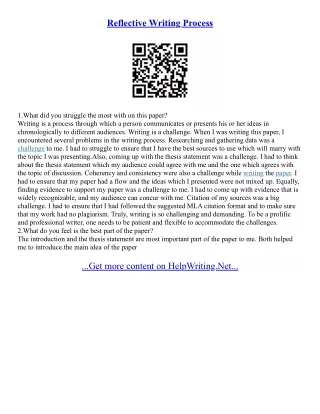
Reflective Essay On Writing Process
>>> How to write an essay? Order on the website: HelpWriting.Net <<< Reflective Writing Process
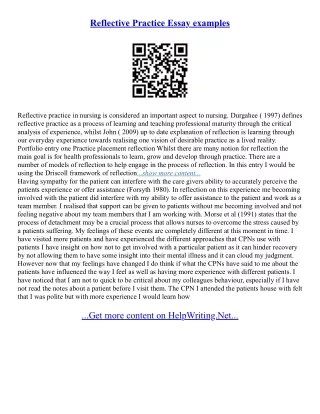
Samples Of Reflective Essay
>>> How to write an essay? Order on the website: HelpWriting.Net <<< Reflective Practice Essay examples, Assessment Reflection Essay examples
2 views • 3 slides
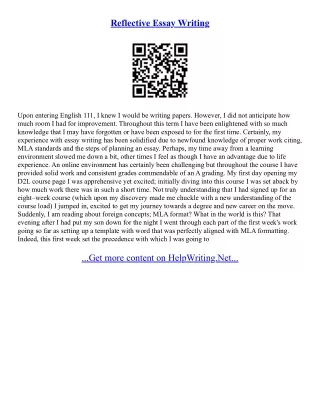
Reflective Essay Writing
>>> How to write an essay? Order on the website: HelpWriting.Net <<< Reflective Essay Writing, Reflective Essay Writing, Reflective Essay Writing, Reflective Essay Writing, Reflective Essay Writing, Reflective Essay Writing
2 views • 11 slides
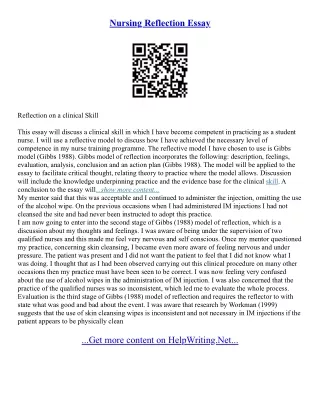
Reflective Essay Nursing
>>> How to write an essay? Order on the website: HelpWriting.Net <<< Nursing Reflection Essay
1 views • 1 slides
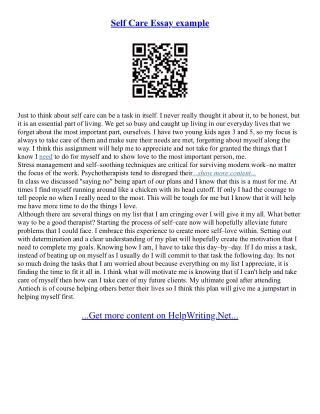
Self Reflective Essay Sample
>>> How to write an essay? Order on the website: HelpWriting.Net <<< Self Care Essay example, Self-Reflective Essay
0 views • 3 slides

IMAGES
VIDEO
COMMENTS
Superficial Reflection: Avoid providing a shallow or superficial reflection on the presentation. Instead, strive to delve deeper into your thoughts, feelings, and insights regarding the experience. Be thoughtful and introspective in your analysis. Lack of Structure: Avoid writing the essay without a clear structure.
This vision of a circular economy for plastic is underpinned by three main actions: (1) Eliminate unnecessary plastic items (2) Innovate to ensure that the plastics we do need are reusable. (3) Circulate all the plastic items we use to keep them in the economy and out of the environment.
Self Reflection on 1st Presentation. Self-Critique of my first presentation Presenter: Drilona Aliu. Description of Experience. Since I was the last one to present in class, I had the advantage of seeing everyone else presenting and catching on their strategies. It seemed that all the previous presenters were very comfortable on presenting and ...
The following reflective essay uses this model to guide my thinking about teamwork, leadership, and time management in relation to creating a group Powerpoint presentation. The aims of this essay are to evaluate the experience of such a type of work and to describe how the things I have learned can be applied to my future nursing practice. We ...
Reflection Assignment. Recording the presentation is the first step, but students will need to thoughtfully watch their presentations to see areas for improvement. To guide the students' thoughts while they watch their presentation video, I developed three sequential reflection assignments, one for each of the major presentations in my class.
Never write the whole essay at once. Space out the time slots when you work on your reflection paper to at least a day apart. This will allow your brain to generate new thoughts and reflections. Short and Sweet - Most reflection papers are between 250 and 750 words. Don't go off on tangents.
Reflective Essay On Presentation. 803 Words4 Pages. As students, presentations are something that is required in most classes yet, students do not see themselves as public speakers. Throughout high school and now in college, I have had to present material in 80 percent of the classes that I have taken. Presenting was, and still is something ...
Here's a recap of the contents of this article, which also serves as a way to create a mind map: 1. Identify the topic you will be writing on. 2. Note down any ideas that are related to the topic and if you want to, try drawing a diagram to link together any topics, theories, and ideas. 3.
Reflective Essay in MLA Format. Times New Roman 12pt font double spaced; 1" margins; The top right includes the last name and page number on every page; Titles are centered; The header should include your name, your professor's name, course number, and the date (dd/mm/yy); The last page includes a Works Cited.
Learn the purpose of writing a reflective essay, and see reflective essay examples. Discover how to format and how to start writing a reflective essay. Updated: 11/21/2023
The style and tone of your reflective essay should match the purpose of the overall assignment. This is a personal essay meant to showcase what you learned from the text, event, or experience that you are writing about. You can use the pronouns "I," "me," and "mine.". Describe the text, event, or experience fully, using plenty of ...
A reflective essay is a type of written work which reflects your own self. Since it's about yourself, you already have a topic to write about. For reflective essay examples, readers expect you to evaluate a specific part of your life. To do this, you may reflect on emotions, memories, and feelings you've experienced at that time.
The reflective essay is one of the most common reflective assignments and is very frequently used for both formative and especially summative assessments. Reflective essays are about presenting reflections to an audience in a systematic and formal way. Generally, all good academic practice for assignments applies when posing reflective essays.
REFLECTION 1: Arterial Blood Gases Interpretation (496 words) Description: I have done on my teaching session with the topic Arterial Blood Gases Interpretation on 15th June 2016, I have been assessed by my senior colleague to evaluate on my overall presentation according to the evaluation of teaching checklist.…. 1564 Words.
Academic reflective writing requires critical and analytic thought, a clear line of argument, and the use of evidence through examples of personal experiences and thoughts and often also theoretical literature. You should aim for a balance between personal experience, tone, and academic practice and rigor. Academic reflective writing should:
Both the language and the structure are important for academic reflective writing. For the structure you want to mirror an academic essay closely. You want an introduction, a main body, and a conclusion. Academic reflection will require you to both describe the context, analyse it, and make conclusions. However, there is not one set of rules ...
Reflection Of A Presentation. Improved Essays. 856 Words. 4 Pages. Open Document. Essay Sample Check Writing Quality. Show More. overall I believe that my presentation went very well. This is because of the visuals used, the examples I presented, the tone of the presentation, and my overall knowledge of the subject.
A reflective report example should begin with an introduction that outlines the purpose of the report and provides an overview of the topics that will be discussed. The body of the report should then provide a detailed analysis of the topic, including reflections on the experience and any lessons learned. Finally, the report should conclude ...
Download. Reflection, Pages 3 (703 words) Views. 44. This year, in our course we were asked to present a group presentation to discuss and develop relevant subjects. In this report I am going to briefly describe the presentation, identify the problems we faced as a group and also the aspects that could have performed better.
Presentation Transcript. Elements of a Reflective Essay • Purpose: explore the connection between a personal experience and what it says about your life and, beyond that, what it says about the meaning of being human • Your subject: an experience that leads you to think about abstract ideas such as love, patience, courage, honor, etc.